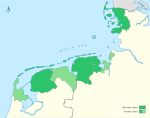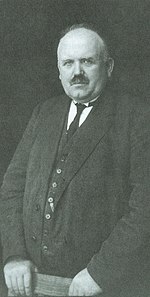Frisian nationalism

Frisian nationalism (
The lands inhabited by Frisians are today known as

Since the end of the Renaissance, these lands have been ruled by foreign powers and Frisian culture has gradually been supplanted in many areas by those of their administrators, with Frisian nationalism arising as a conscious movement primarily in the 19th century.[3] In the 19th and 20th centuries, increasing contacts between Dutch and German Frisians spurred the formation of a transnational consciousness which was typified by conceptions of a shared history, an occasionally ambivalent or even absent relationship with the Frisian language (which had been supplanted by Dutch and German in many areas), an emphasis on peripheral rurality, and a view of Frisians as having a "loving, independent and level-headed" character.[2] However, despite the romanto-mythical notions of early Frisian nationalists who often wrote of a Great Frisian Empire of the past and modern Frisia's historical continuity with it, modern-day historical research has indicated that Frisia has long had a complex sociopolitical landscape and that modern Frisia's relationship to its past contains some elements which are "discontinuous, ambivalent and even contrary."[2]
History
Antecedents
There have been occasional early expressions of Frisian nationalism. One scholar, speaking of Frisian resistance to the Franks, wrote that "for over sixty years Frisian nationalism and heathenism also went hand in hand, as heathenism proved an indispensable ideological component of the resistance to Frankish imperialism."[4] The 16th century in particular represented an early peak.[5][6] In that century, it was popular among West Frisians to attach Frisius to one's surname, and the historian Suffridius Petrus (1527–1597) composed an anthology of Frisian writers entitled De scriptoribus Frisiae (On Frisian Writers). In addition, Petrus was also an early advocate of the "Magna Frisia" (Greater Frisia) concept.[5] Petrus had even claimed that Prester John was a Frisian prince named John Adgill.[6] The North Frisian chronicler Peter Sax wrote in 1636 that the Frisians had "a common language...so they are also all one people with each other."[7] Sax set out to collect knowledge and historical maps about North Frisia and published his research in 1638 as a parchment volume.[8]
Dutch Frisia
The origins of modern Frisian nationalism lay primarily in the 19th century,

Earlier appeals to Frisian liberty were primarily political rather than cultural in character and could be traced back to an alleged exemption from feudalism granted to the Frisians by Charlemagne. In the High Middle Ages, Frisians, who then formed a free confederation, used this alleged history for political purposes by legitimising armed resistance to domination, as was seen in the Battle of Warns.[2] In the 19th century, however, after Frisia had been subsumed into the Sovereign Principality of the United Netherlands, Frisians compensated for their loss of political autonomy with a new-found cultural nationalism.[2] As with many other nationalisms, the Frisian nationalist project required turning an array of indistinct ethnic communities speaking differing variants of the Frisian language, German and/or Dutch into a single self-aware nation of "Frisians." In the Netherlands, where West Frisian remains by far the most widely spoken Frisian language, these nationalists also placed heavy emphasis on language as the "soul of the nation",[2] and its preservation has come to define the movement of autonomy.[9] Frisian intellectuals increasingly began to write in the language after it had formerly been purely a spoken language.[10] In general, a large number of societies formed in the 19th and early 20th centuries to promote Frisian cultural interests.[3]
Historiography has also played a key role, particularly in earlier times, as it was in the medieval past that an example of a free Frisian polity could be found. As one author put it, the Frisian nation "existed only in so far as [its history, literature, and language] was talked about." This thirst for historical study was satisfied in part through publications such as the Frisian People's Almanac (Friesche Volksalmanak) which was primarily devoted to historiographic writings. Around 1880, this almanac took on a more chauvinist tone and stressed the need for "purity" of the Frisian people and viewed the Frisians as having retained early Germanic culture and customs in its purest form, whereas the Dutch have corrupted it.[11] Another popular symbol of Frisian nationalism since the beginning of the 20th century has been the Friesian horse,[9][12] and regional breeders began to stress the need for Friesian purebreds over reliance on foreign horse breeds.[12]
German Frisia

North Frisia
Modern-day Germany is home to two of the three segments of Frisia as typically defined by proponents. One of these is
One notable individual who supported some semblance of Frisian identity was Cornelius Petersen (1882–1935), a farmer who grew up speaking Low German but later learned both Frisian and Danish in addition to agitating for greater autonomy in Schleswig. In his pamphlet Die friesische Bewegung (The Frisian Movement), he took up a Frisian identity and argued that a model should be sought in the "yeoman republicanism of Frisians, Dithmarshers, and medieval Saxons" rather than the centralising expansionism of Franks, Prussians, or Danes.[11] Petersen argued that Frisians had lost their national pride by excessively adopting foreign traditions and being taught by their invaders to look down upon their own as "provincial" and "anachronistic." Nonetheless, in his vision, Frisian was not used as an ethno-linguistic category to justify state nationalism, but rather a symbol for the "peasant tradition" of southwestern Jutland, contrasting "organic local community" with state bureaucracy and thus arguing for pre-modern localism and regionalism. As a result, this idiosyncratic anti-nationalism failed to garner a widespread following.[11]
East Frisia
In modern times,
Modern day
Frisians are recognised as a distinct national minority in Germany,
Despite the modern survival of the West Frisian language in Friesland, use of Frisian in church services has remained controversial as late as the 1980s, and approval from local consistories has been needed to utilise the language in hymns and sermons.[19]
In modern times, Frisian nationalism has, as with other nationalisms, been expressed through
Political groups

Transnational
The Interfrisian Council was founded in 1956 in order to represent the interests of all regions of Frisia across both Germany and the Netherlands.
Netherlands
The Frisian National Party was founded in 1962 and supports greater regional autonomy for Frisians in the Netherlands.
Groep fan Auwerk, on the other hand, goes one step further in advocating for an independent Frisian nation-state.
Germany
The South Schleswig Voters' Association was founded in 1948 and advocates for both the Frisian and Danish minorities of the state of Schleswig-Holstein in Germany.
See also
- Frisian history
- Frisian languages
- Regionalism (politics)
- Stateless nation
References
- OCLC 391593170.
- ^ )
- ^ a b c d e Boucher, Harrison (2017). "Ethnolinguistic Nationalism in Fryslân". Gustavus Adolphus College.
- OCLC 34050915.
- ^ OCLC 17354182.
- ^ OCLC 1112671788.
- OCLC 53814304.
- OCLC 266230484.
- ^ a b c d Hannan, Martin (2017). "Wha's Like Us: The independence movements of the Netherlands & Poland". The National.
- ISBN 9789004398436.
- ^ JSTOR 40920788.
- ^ OCLC 1128890345.
- OCLC 964453412.
- ^ OCLC 1112671727.
- Federal Ministry of the Interior, Building and Community.
- ^ a b Muscato, Christopher. "Ethnic Groups in the Netherlands". Study.com.
- ^ West Frisian at Ethnologue (18th ed., 2015)
- OCLC 1137735471.
- OCLC 829706614.
